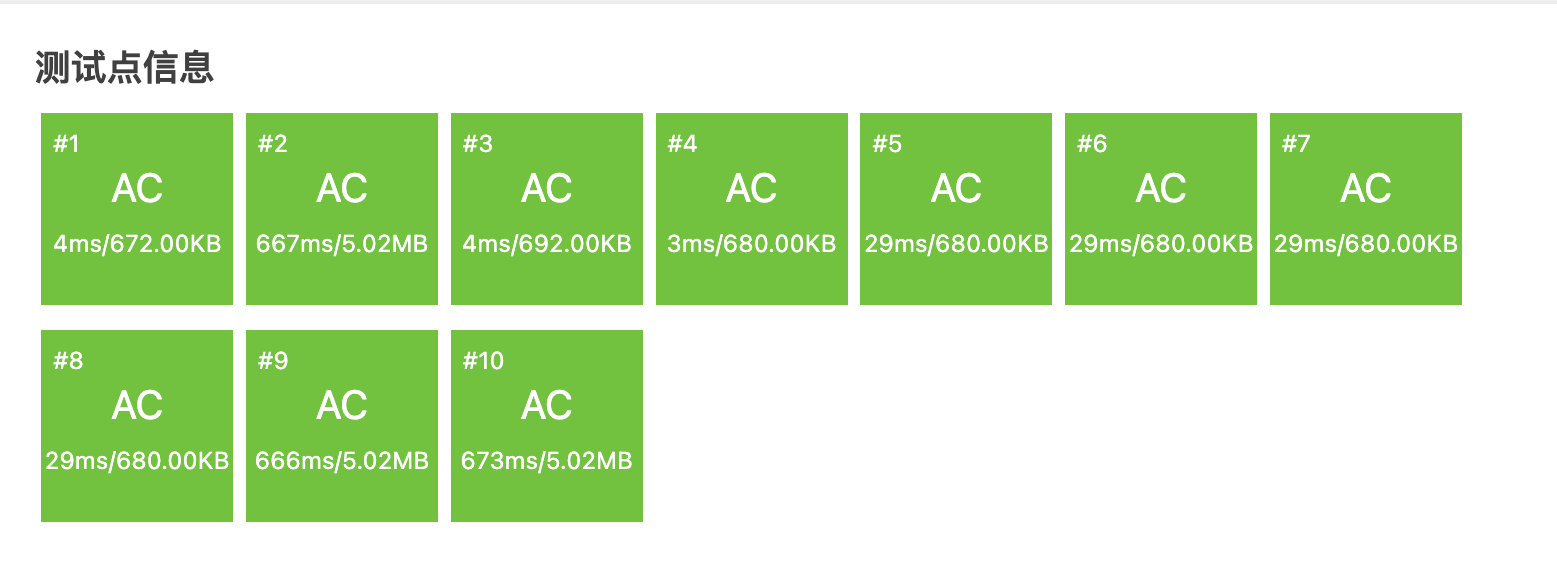开O2才可以进1s

#include<bits/stdc++.h>
using namespace std;
using ll=long long;
int P;
using i64 = long long;
// assume -P <= x < 2P
int norm(int x) {
if (x < 0) {
x += P;
}
if (x >= P) {
x -= P;
}
return x;
}
template<class T>
T power(T a, i64 b) {
T res = 1;
for (; b; b /= 2, a *= a) {
if (b % 2) {
res *= a;
}
}
return res;
}
struct Z {
int x;
Z(int x = 0) : x(norm(x)) {}
Z(i64 x) : x(norm(x % P)) {}
int val() const {
return x;
}
Z operator-() const {
return Z(norm(P - x));
}
Z inv() const {
assert(x != 0);
return power(*this, P - 2);
}
Z &operator*=(const Z &rhs) {
x = i64(x) * rhs.x % P;
return *this;
}
Z &operator+=(const Z &rhs) {
x = norm(x + rhs.x);
return *this;
}
Z &operator-=(const Z &rhs) {
x = norm(x - rhs.x);
return *this;
}
Z &operator/=(const Z &rhs) {
return *this *= rhs.inv();
}
friend Z operator*(const Z &lhs, const Z &rhs) {
Z res = lhs;
res *= rhs;
return res;
}
friend Z operator+(const Z &lhs, const Z &rhs) {
Z res = lhs;
res += rhs;
return res;
}
friend Z operator-(const Z &lhs, const Z &rhs) {
Z res = lhs;
res -= rhs;
return res;
}
friend Z operator/(const Z &lhs, const Z &rhs) {
Z res = lhs;
res /= rhs;
return res;
}
friend std::istream &operator>>(std::istream &is, Z &a) {
i64 v;
is >> v;
a = Z(v);
return is;
}
friend std::ostream &operator<<(std::ostream &os, const Z &a) {
return os << a.val();
}
};
template < typename T, auto op, auto e, typename F, auto mapping, auto composition,
auto e1 >
class segtree
{
int n;
vector< T > v;
vector< F > lazy;
void build(int now, int l, int r, T a[])
{
if(l == r)
{
v[now] = a[l];
return;
}
int mid = (l + r) / 2;
build(now * 2, l, mid, a);
build(now * 2 + 1, mid + 1, r, a);
v[now] = op(v[now * 2], v[now * 2 + 1]);
}
void pushup(int k) { v[k] = op(v[k * 2], v[k * 2 + 1]); }
void pushdown(int k, int l, int r)
{
v[k] = mapping(v[k], lazy[k], l, r);
if (l != r) {
lazy[k * 2] = composition(lazy[k * 2], lazy[k]);
lazy[k * 2 + 1] = composition(lazy[k * 2 + 1], lazy[k]);
}
lazy[k] = e1();
}
void modify(int now, int ql, int qr, int l, int r, F x)
{
pushdown(now, l, r);
if (l > qr || r < ql) return;
if (l >= ql && r <= qr) {
lazy[now] = x;
pushdown(now, l, r);
return;
}
modify(now * 2, ql, qr, l, (l + r) / 2, x);
modify(now * 2 + 1, ql, qr, (l + r) / 2 + 1, r, x);
pushup(now);
}
T query(int now, int ql, int qr, int l, int r)
{
pushdown(now, l, r);
if (l > qr || r < ql) return e();
if (l >= ql && r <= qr) return v[now];
return op(query(now * 2, ql, qr, l, (l + r) / 2),
query(now * 2 + 1, ql, qr, (l + r) / 2 + 1, r));
}
public:
segtree(T a[], int n) : segtree(n)
{
build(1, 1, n, a);
}
segtree(int n)
{
this->n = n;
v = vector< T >(n << 2, e());
lazy = vector< F >(n << 2, e1());
}
void modify(int l, int r, F x) { modify(1, l, r, 1, n, x); }
T query(int l, int r) { return query(1, l, r, 1, n); }
};
template<typename T>
T MAX(T x, T y) {if(x > y) return x; else return y;}
template<typename T>
T MIN(T x, T y) {if(x < y) return x; else return y;}
template<typename T>
T PLUS(T x, T y) {return x + y;}
template<typename T,typename D>
T LAZY(T x,T lazy,D l,D r){return x + (r - l + 1) * lazy;}
/* Note:
typename T, auto op, T e,
typename F, auto mapping, auto composition,
F e1
*/
using segtree_add=segtree< ll, PLUS<ll>, [](){return 0ll;}, ll,[](ll x, ll lazy, int l, int r) { return x + (r - l + 1) * lazy; }, PLUS<ll>, [](){return 0ll;} >;
//using segtree_min=segtree< ll, MIN<ll>, (ll)1e9, ll,[](ll x, ll lazy, int l, int r) { return x+lazy; },PLUS<ll>, 0 >;
//using segtree_add=segtree< ll, PLUS<ll>, 0, ll,LAZY<ll,int>, PLUS<ll>, 0 >;
struct F{
Z mul;
Z add;
};
using segtree_add_mul=segtree< Z, [](Z x, Z y) { return x + y; }, [](){return Z(0);},
F, [](Z x, F t, int l, int r) { return x * t.mul + (r - l + 1) * t.add; },
[](F t1, F t2)->F { return {(t1.mul * t2.mul), (t1.add * t2.mul + t2.add)}; },
[]()->F{return {1, 0};} >;
ll n,m;
int main(){
ios::sync_with_stdio(false);
cin.tie(0);
cin>>n>>m>>P;
segtree_add_mul s(n);
for(int i=1,x;i<=n;++i)cin>>x,s.modify(i,i,F{0,x});
for(int i=1,op,x,y,z;i<=m;++i){
cin>>op>>x>>y;
if(op==1){
cin>>z;
s.modify(x,y,F{z,0});
}else if(op==2){
cin>>z;
s.modify(x,y,F{1ll,z});
}else {
cout<<s.query(x,y)<<"\n";
}
}
}
